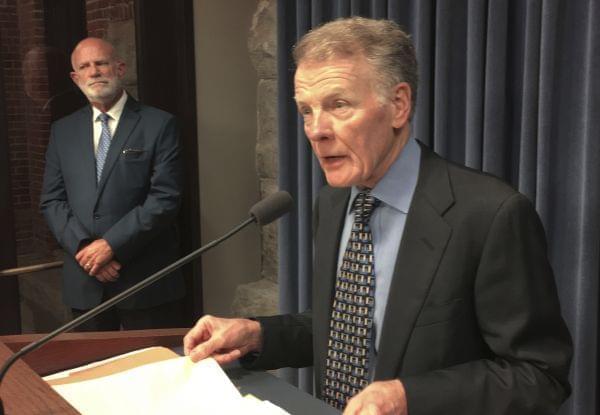Madigan, Rauner Tout Accomplishments, ‘Epic Struggle’ Over Budget

Illinois House Speaker Michael Madigan (D-Chicago), speaking at a 2017 news conference in Springfield. John O'Connor/AP
The Illinois House wrapped up its two-year session Tuesday with legislation to help the incoming governor, with House Speaker Michael Madigan praising lawmakers for persevering in an "epic struggle" over state spending with outgoing Gov. Bruce Rauner. Meanwhile, Rauner previewed a report to lawmakers that showcased his administration's accomplishments.
The Democratic House majority endorsed measures to allow Gov.-elect J.B. Pritzker to offer higher salaries to his cabinet and to replace a problematic Illinois Tollway board. The legislation moves to the Senate for action before the 101st General Assembly convenes on Wednesday.
The two-year session saw Madigan, who's held the gavel for all but two years since 1983, become the longest-serving state House speaker in U.S. history during a critical period in which he proved his mettle.
The Republican Rauner's insistence on approval of his conservative agenda in exchange for an annual budget deal had left Illinois without a spending plan for two years. Madigan lured enough Republicans in July 2017 to approve an income-tax increase to fund an annual budget over Rauner's vetoes, ending what Madigan on Tuesday called an "epic struggle."
"You deserve credit for what you do day-in and day-out, but you know that from time to time, the issues become more significant on one day than they were on a prior day or they may be on a future day," Madigan said. "And that's exactly what happened in that struggle between the Legislature and the executive department."
Rauner, who relinquishes the office to Pritzker on Monday, previewed the end-of-term report he must present to the Legislature. He highlighted his involvement in landmark 2017 legislation to make public school funding fairer, cutting red tape for small businesses, improving Medicaid and winning a U.S. Supreme Court case he initiated that prohibits government unions from collecting "fair-share" administrative fees from nonunion members.
But he said the report will also encourage the business-friendly changes he came into office trumpeting and which prompted the budget showdown. When it was suggested that voters had repudiated that agenda by choosing the Democratic Pritzker in November, Rauner said, "Change is hard."
"The folks that created the massive problems in our state certainly are resistant to change," Rauner said. "That doesn't mean that our recommendations are somehow wrong or flawed. It means it's going to take time to communicate with the voters and get the changes done."
Pritzker, who wasn't part of the proceedings, was the main beneficiary of Tuesday's action. The House voted 68-37 to change state law and increase annual pay for the director of prisons, the transportation secretary and the directors of other agencies governing human services, health care, the environment and more.
Pritzker said Illinois salaries for agency directors and assistant directors aren't competitive. The legislation would increase the highest salaries from $150,000 to $172,500.
Critics complained that nonunion middle managers have dealt with salary freezes for 15 or more years. They said the state can't afford higher pay when there's a $130 billion hole in what the state owes to its pension systems.
By a vote of 100-6, the House approved allowing Pritzker to abolish the terms of the Tollway board that oversees 294 miles (473 kilometers) of tolled interstate highway in northeastern Illinois because of questionable spending.
Opponents argued that replacing the board would delay the Tollway's construction work scheduled for this spring. Republican Rep. Jeanne Ives called the legislation a political ploy because a majority of board members' terms will expire by May.
___
Follow Associated Press Political Writer John O'Connor at https://twitter.com/apoconnor .

